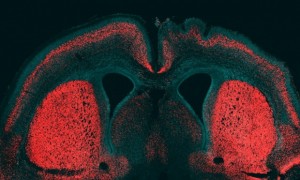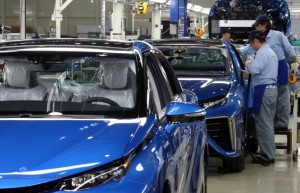
Mouse cerebral cortex (above): mouse embryos injected with the gene identified by scientist as key to human cognitive faculties grew larger brain regions and some developed the crinkled brain surface that humans have.
Credit: Marta Florio and Wieland B. Huttner, Max Planck Institute of Molecular Cell Biology and Genetics
A strand of DNA that lies at the heart of what makes humans unique in the animal kingdom has been identified by researchers in Germany.
Scientists in Dresden found a gene that drives the expansion of the human brain and helps to make it the most complex structure in the universe.
Researchers believe the gene plays a pivotal role in human cognition by ramping up dramatically the number of neurons […]

Babies who were breastfed at 1 and 6 months had specific gut microbiome compositions, which the researchers say may affect immune system development.
A series of studies set to be presented at the American Academy of Allergy, Asthma & Immunology’s Annual Meeting in Houston, TX, claim an infant’s immune system development and susceptibility to asthma and allergies may be influenced by a number of factors that shape what bacteria is in their gut, such as gestational age at birth, breastfeeding and delivery by Cesarean section.
The research team, including Dr. Christine Cole Johnson, chair of the Department of Public Health Sciences at Henry Ford Hospital in Detroit, MI, says the findings further support the “hygiene hypothesis” – the idea that early childhood exposure to pathogens affects later-life risk of disease.
“For years now, we’ve always thought that a sterile environment was not good for babies. Our research shows why. Exposure to these micro-organisms, or bacteria, […]
Solar power is set to become the cheapest power source in many parts of the world by 2025, according to a new study by the Fraunhofer Institute for Solar Energy Systems commissioned by Agora Energiewende.
The independent think-tank of 18 experts conclude that by 2025 the cost of producing power in central and southern Europe will have declined to between 4 and 6 cents per kilowatt hour, and by 2050 to as low as 2 to 4 cents.
The study is based entirely on “conservative assumptions” about the future of solar development, excluding any potential breakthroughs that could theoretically make solar even more effective. But we’ve already seen the cost of solar drop dramatically over the past, and such is expected to continue.
“The study shows that solar energy has become cheaper much more quickly than most experts had predicted and will continue to do so,” says Dr. Patrick Graichen, Director of the Agora Energiewende.
“Plans […]
A national poll of Republican primary voters conducted by Public Policy Polling finds that 57 percent of these voters support “establishing Christianity as the national religion.” The First Amendment to the United States Constitution provides that “Congress shall make no law respecting an establishment of religion.”
Only 30 percent of Republican voters believe that Congress should not make a law respecting an establishment of religion, according to the poll.
The same poll also finds that 74 percent of GOP primary voters have a favorable opinion of former President George W. Bush. Two-thirds (66%) do not believe in global warming, and a plurality (49%) do not believe in evolution.














